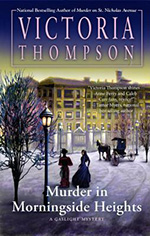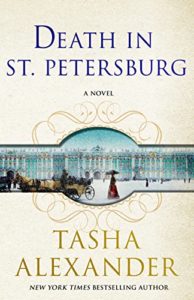C.M. Gleason: Murder in the Lincoln White House
 C.M. Gleason is well known as Colleen Gleason, the writer of the Gardella Vampire Chronicles, as well as some romance and some mystery themed novels featuring vampires. As C.M. Gleason she’s veering into straight up mystery territory, but her long experience as an ink-stained wretch (my term for a professional writer who works all the time) has commented her skills in terms of narrative and character development. While she’s new to the mystery genre, she’s not new to writing, and it certainly shows in this assured first mystery.
C.M. Gleason is well known as Colleen Gleason, the writer of the Gardella Vampire Chronicles, as well as some romance and some mystery themed novels featuring vampires. As C.M. Gleason she’s veering into straight up mystery territory, but her long experience as an ink-stained wretch (my term for a professional writer who works all the time) has commented her skills in terms of narrative and character development. While she’s new to the mystery genre, she’s not new to writing, and it certainly shows in this assured first mystery.
 If you are a fan of great writers of the recent past like Mary Stewart or Daphne du Maurier, Lauren Willig is the writer for you, truly putting the romance part into romantic suspense. A clever mystery, a tragic romance, unforgettable characters—several of whom are dead—Willig has all the elements of romantic, gothic suspense in her story and she runs away with them.
If you are a fan of great writers of the recent past like Mary Stewart or Daphne du Maurier, Lauren Willig is the writer for you, truly putting the romance part into romantic suspense. A clever mystery, a tragic romance, unforgettable characters—several of whom are dead—Willig has all the elements of romantic, gothic suspense in her story and she runs away with them. While not as emotionally engrossing a novel as last year’s The One Man, and not even really a crime novel, this story really can’t be beat. As most of it is true, unbelievably enough, what Gross has done is to tell the story of some incredible WWII heroes while giving it an emotional center in his main character, Kurt Nordstrum, apparently based on the actual historical figure of Kurt Haukelid. Gross adds some romantic and personal elements to give depth to the character, and the story turns on his actions, but this story is so rocket powered it’s hard to stop reading, and just as hard to believe it’s true.
While not as emotionally engrossing a novel as last year’s The One Man, and not even really a crime novel, this story really can’t be beat. As most of it is true, unbelievably enough, what Gross has done is to tell the story of some incredible WWII heroes while giving it an emotional center in his main character, Kurt Nordstrum, apparently based on the actual historical figure of Kurt Haukelid. Gross adds some romantic and personal elements to give depth to the character, and the story turns on his actions, but this story is so rocket powered it’s hard to stop reading, and just as hard to believe it’s true. This book hits the ground running and invites you, as a reader, to keep up, plunge in, and take off along with it. Set in the British countryside in 1928, the setting is one I’ve rarely read about, and the characters, gypsies and the hard-working poor, ones rarely focused on. There are two threads to the story, and it took me awhile to figure out where the author was heading and what she had in mind.
This book hits the ground running and invites you, as a reader, to keep up, plunge in, and take off along with it. Set in the British countryside in 1928, the setting is one I’ve rarely read about, and the characters, gypsies and the hard-working poor, ones rarely focused on. There are two threads to the story, and it took me awhile to figure out where the author was heading and what she had in mind. It’s been awhile since I checked in with Thompson’s midwife character, Sarah, and I was a bit surprised to find her married, wealthy, and an unwilling lady of leisure. Like her sister character Molly Murphy, the leisured life is not going to suit her for too long, and she’s in on Frank Malloy’s first case as a private detective. This series is set in turn of the century New York. Malloy had been a policeman; at the time, the police were far more likely to investigate a case involving a reward. Malloy, knowing the ins and outs of the police department, is almost a step ahead as he works on his own.
It’s been awhile since I checked in with Thompson’s midwife character, Sarah, and I was a bit surprised to find her married, wealthy, and an unwilling lady of leisure. Like her sister character Molly Murphy, the leisured life is not going to suit her for too long, and she’s in on Frank Malloy’s first case as a private detective. This series is set in turn of the century New York. Malloy had been a policeman; at the time, the police were far more likely to investigate a case involving a reward. Malloy, knowing the ins and outs of the police department, is almost a step ahead as he works on his own. I love Tasha Alexander – her books are all so delicious in every way, but this one may be my absolute favorite. Lady Emily accompanies her husband (who is on an espionage mission) to Russia, where she is just supposed to be enjoying herself and having a little vacation. Ha! The book opens with a dead ballerina in the snow. Lady Emily is present at the discovery of the body, and of course, she’s drawn into the investigation.
I love Tasha Alexander – her books are all so delicious in every way, but this one may be my absolute favorite. Lady Emily accompanies her husband (who is on an espionage mission) to Russia, where she is just supposed to be enjoying herself and having a little vacation. Ha! The book opens with a dead ballerina in the snow. Lady Emily is present at the discovery of the body, and of course, she’s drawn into the investigation. Rhys Bowen’s Lady Georgie series is about the most fun you can have “between the covers.” Ever since the publication of Her Royal Spyness (2007), Bowen has trod the delicate line between humor, character development and great plotting to provide one of the more completely enjoyable series in the mysterious universe. Lady Georgie, for the uninitiated, lives in 1930’s London and is 34th in line to the throne. She’s impoverished but does get assignments from the Queen to do a little “family” spying – at the time, Queen Mary’s greatest worry was the Prince of Wales’ relationship with Wallis Simpson.
Rhys Bowen’s Lady Georgie series is about the most fun you can have “between the covers.” Ever since the publication of Her Royal Spyness (2007), Bowen has trod the delicate line between humor, character development and great plotting to provide one of the more completely enjoyable series in the mysterious universe. Lady Georgie, for the uninitiated, lives in 1930’s London and is 34th in line to the throne. She’s impoverished but does get assignments from the Queen to do a little “family” spying – at the time, Queen Mary’s greatest worry was the Prince of Wales’ relationship with Wallis Simpson. We sell a TON of James R. Benn titles, often this first one, Billy Boyle. Billy is an Irish cop circa 1942, when he’s drafted. His uncles, who lived through WWI, don’t like the idea of Billy going overseas so they pull some strings, getting him assigned to a “cushy” desk job with cousin Ike (a.k.a. Eisenhower). While I usually dislike historical novels featuring real people, cousin Ike (other than getting Billy over to England) only plays a small part in the story, so I was OK with it.
We sell a TON of James R. Benn titles, often this first one, Billy Boyle. Billy is an Irish cop circa 1942, when he’s drafted. His uncles, who lived through WWI, don’t like the idea of Billy going overseas so they pull some strings, getting him assigned to a “cushy” desk job with cousin Ike (a.k.a. Eisenhower). While I usually dislike historical novels featuring real people, cousin Ike (other than getting Billy over to England) only plays a small part in the story, so I was OK with it. The second novel in Candace Robb’s Kate Clifford series finds the feisty Kate dealing with her mother moving in next door, bringing along with her some “beguines” or women who live a religious life but not in a convent. They devoted themselves to charitable work. Kate is wary of her Mother’s newfound earnest faith and of her mother in general, and with good reason, as Robb teases out more of Kate’s family backstory throughout the book.
The second novel in Candace Robb’s Kate Clifford series finds the feisty Kate dealing with her mother moving in next door, bringing along with her some “beguines” or women who live a religious life but not in a convent. They devoted themselves to charitable work. Kate is wary of her Mother’s newfound earnest faith and of her mother in general, and with good reason, as Robb teases out more of Kate’s family backstory throughout the book. Laura Joh Rowland is well known to mystery fans as the author of the Sano Ichiro mysteries set in 17th century Japan. She’s also taken on Charlotte Bronte in other novels, and here she creates a new character, photographer Sarah Bain, who lives in Victorian London at the same time as Jack the Ripper. While there are many, many books about Jack the Ripper—the fact that he was never found will always be fuel for speculation—he’s almost like Sherlock Holmes in that the permutations and impressions of his life (and crimes) are varied and plentiful, and the interpretations can range from the dull to the nutty to the creative. Rowland goes for the creative.
Laura Joh Rowland is well known to mystery fans as the author of the Sano Ichiro mysteries set in 17th century Japan. She’s also taken on Charlotte Bronte in other novels, and here she creates a new character, photographer Sarah Bain, who lives in Victorian London at the same time as Jack the Ripper. While there are many, many books about Jack the Ripper—the fact that he was never found will always be fuel for speculation—he’s almost like Sherlock Holmes in that the permutations and impressions of his life (and crimes) are varied and plentiful, and the interpretations can range from the dull to the nutty to the creative. Rowland goes for the creative.